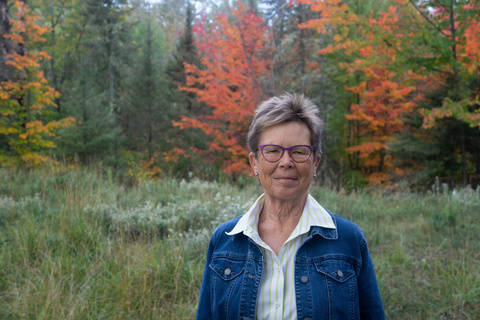
The Writing University hosts the 5Q Interview series with authors from the University of Iowa Press. We sit down with UI Press authors to ask about their work, their process, their reading lists and events. Today we are speaking with Carolyn Chalmers, author of They Don’t Want Her There.
1. Can you tell us a little bit about your new book They Don’t Want Her There?
The story: a grueling, eight-year effort to bring justice for a Chinese American professor, Dr. Jean Jew M.D., who was vilified with sexual slurs by faculty colleagues. The place: University of Iowa. The time: At the dawn of sexual harassment law, in the 1970’s and 80’s. The genre: Memoir. Far from a ‘how-to’ book, it records my personal reflections on our experiences, that is mine and Jean’s, to hold the University and its College of Medicine accountable. The language: Sexual slurs were weaponized against Jean. The book necessarily recounts some of this offensive language.
Its significance:
· The story resonates with today’s growing awareness of the hyper-sexualization of Asian women and the violence that accompanies it. Asian women today are calling for amplification of their voices so that their strength and diversity are better understood. Retelling Jean’s story responds to this call.
· Two Iowa institutions are central to this story. Iowa judges and juries demonstrated their ability to navigate the hotly contested landmines of sexual harassment and academic freedom in a university culture.
· Memories shape the future. Memorializing our story from my point of view contributes to a better future for university women--teachers and students. My memory is of a University clinging to denial, but ultimately changing for the better.
2. Did you do any work on this book during the pandemic?
Yes. The pandemic removed daily distractions but also hollowed out my every day. I was grateful to have had an engrossing project during the lockdown. Just before covid hit Jean visited me in Minneapolis. She read, and we discussed, the draft. I reworked it and submitted it to the University of Iowa Press in October 2020. To the Press’ great credit, (since the University does not come off well in this story) the manuscript was accepted for publication. Several months passed while I worked with the Press’ editor, Meredith Sabel. The ‘final’ manuscript was submitted not once but several times during the summer of 2021. My writing deadlines mirrored the pandemic’s deadlines--often proclaimed but approached by stuttering steps.
3. Do you have any plans for readings or events for this book, either in person or virtual?
I presented on zoom in March 2022 to the St Paul, MN chapter of the American Association of University Women. Professor Barbara Welke at the U of MN has assigned the book to the students in her U.S. Women’s Legal History undergraduate class and Jean and I will talk with the class this April. I meet with two book groups in May. I am available to come to Iowa City.
4. What are you reading right now? Any books from other university or independent presses?
Right now I am reading Matters of Chance, a beautifully written novel of family love and loss by Jeannette Haien. As hypersonic missiles rain down on Ukraine, and the one-year anniversary results in re-telling of the Atlanta spa murders of Asian women, I want to be engrossed in a novel that is devoid of physical violence. I loved it the first time I read it over twenty years ago.
I could mention so many interesting reads from independent publishers. I look forward to reading two books from the U of Iowa Press; Equal before the Law and Radicals, Vol 2. I read Pioneer Work in Opening the Medical Profession to Women by Elizabeth Blackwell (Adansonia Publishing); Godland by Lyz Lenz (Indiana University Press); and We are Meant to Rise by Carolyn Holbrook and David Mura (University of Minnesota Press). Authors in my writing/reading group have published wonderful books with independent presses--Fine, Thanks by Mary Dunnewold (Black Rose Writing) and Shelter in Place by Rob Hardy (Finishing Line Press).
5. What is your writing routine? Do you have a daily routine?
When I am home I start my morning early with the NYTimes and the Minneapolis StarTribune. I go to my study, scan email and texts (not social media) and begin writing. The morning is my best writing time. After a mid-day break to take a walk outside if the weather cooperates, I return to my desk for a few hours.